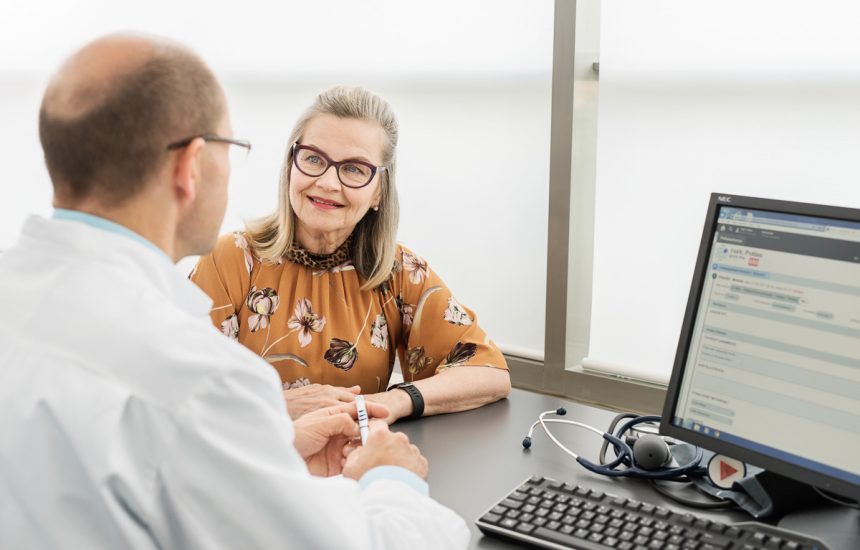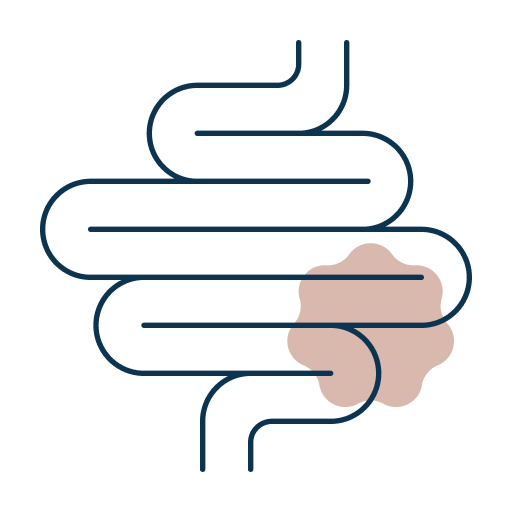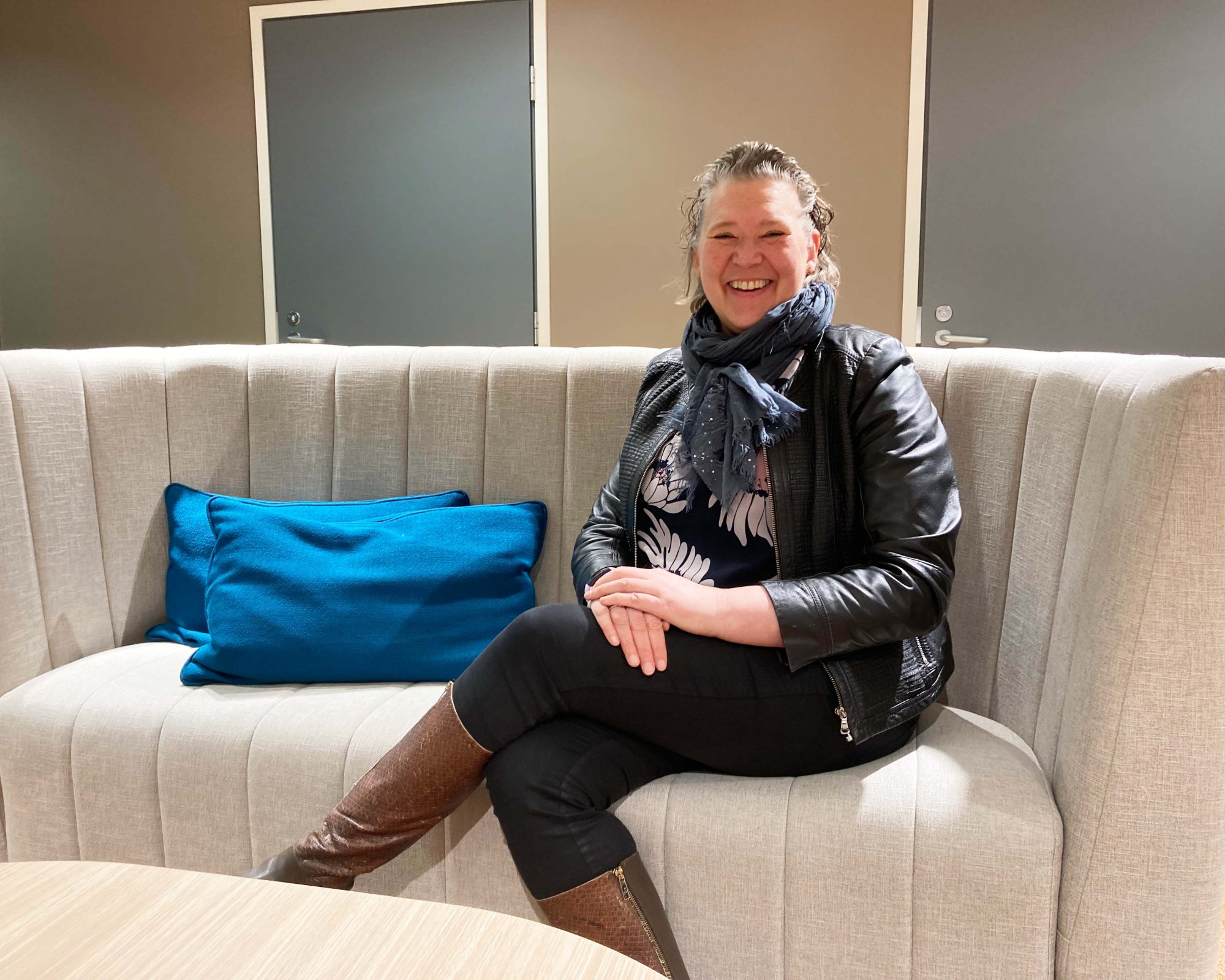Early detection of colorectal cancer significantly improves treatment prognosis
9.7.2024 Categories: Articles
Colorectal cancer and its precursors can be detected even when the disease is completely asymptomatic. Colorectal cancer almost always develops from a benign polyp. Over time, a benign polyp may turn into a malignant cancer if not removed in time.
How colorectal cancer progresses
The intestine is a tubular structure consisting of three layers: the mucous membrane, the muscle layer and the outer layer. The intestines interact with the rest of the system via the lymphatic and circulatory systems.
The development of a cancerous tumor in the intestine begins with a polyp in the innermost layer of the intestine, the mucous membrane. The tumor initially grows locally on the mucous membrane. At that point, the cancer cells do not spread elsewhere in the body. If the tumor continues to grow, it gradually penetrates the mucous membrane, progressing to the muscle layer and further to the outermost layer and possibly even beyond the intestine. From these layers outside the mucous membrane, the cancer cells have the potential to spread with the blood and lymphatic circulation to other parts of the body, most commonly to the lymph nodes, liver and lungs.

FIT test and colonoscopy help to detect changes early
The presence of intestinal tumors, cancer and polyps can be determined by a FIT test conducted with a stool sample. The test can be used to detect the breakdown products of red blood cells in the stool sample, which may indicate abnormalities in the intestine. A positive FIT test result requires colonoscopy as a follow-up examination in order to confirm, locate and treat any findings.
The FIT test is an easy and quick test to do at home. It is ideal for asymptomatic people who want to assess their risk of colorectal cancer if their close relative has been diagnosed, for example. While some private healthcare providers offer FIT tests, only a few providers offer interpretations of FIT test results. Docrates is one of those few providers.
Colonoscopy, or endoscopy of the colon, is necessary when examining symptoms and diseases of the rectum and colon. A colonoscopy helps to detect polyps, tumors, infections, diverticula, ulcers, vascular abnormalities and obstructions on the mucous membrane. Any polyps are removed during the colonoscopy. Removing benign polyps early prevents them from becoming cancerous. Colonoscopy is the most reliable examination for finding tumors and abnormalities in the colon and rectum.
Early-stage colorectal cancer is easier to treat
Early diagnosis of colorectal cancer is crucial not only for the prognosis but also for the need for treatment.
Colorectal cancer prognosis
- Over 90%, if the cancerous tumor is local and superficial.
- 50–70%, if the cancer has progressed to the intestinal layers but no metastases are found.
- 5–10%, if metastases are found elsewhere in the body in addition to the intestinal tumor.
In order to find colorectal cancer or its precursors with the greatest certainty, it is important that the colonoscopy is performed by an experienced professional who is capable of performing the endoscopy in a technically comprehensive manner and knows how to find and identify changes in the intestinal mucosa. With experienced specialists working at Docrates, you know you’re in good hands. The examinations and treatments are carried out in a multidisciplinary team, for example by Jorma Heiskanen, Specialist in Gastroenterological Surgery, and Tuomo Alanko, Oncologist.
Docrates specialises in early diagnostics and treatment of colorectal cancer
If any abnormalities are observed in the colonoscopy, Docrates ensures a quick treatment path. The steps after endoscopy include biopsy analysis, tumor staging, computer imaging and, possibly, magnetic resonance imaging. The laboratory sends the sample results quickly, even within a few days. Based on the results, a treatment plan is drawn up and the treatment is arranged on a quick schedule.
Surgery, radiotherapy and pharmacotherapy are used to treat a diagnosed colorectal cancer according to an individual treatment plan. More than 90% of superficial, local colorectal cancers are healed with the correct treatment. If the cancerous tumor has penetrated the intestinal layers and metastases are found, the prognosis decreases significantly. Follow-up with blood tests, endoscopy and imaging tests will continue after the colorectal cancer treatments have been completed. Regular follow-up examinations ensure that possible new polyps are detected in good time before they develop into cancerous tumors.
Docrates – colorectal cancer specialist at your service
- Colonoscopies are performed by experienced endoscopists only.
- We use advanced endoscopy equipment, utilising artificial intelligence.
- Efficient treatment path: after the endoscopy, the treatment plan is prepared on the basis of tumor staging, CT scan, blood tests and, possibly, MRI.
- The oncologists at Docrates specialise in the comprehensive treatment of cancer, follow international treatment guidelines and use solutions such as molecular diagnostics when planning treatments.
- Docrates ensures an efficient flow of information to the patient. The treatment is always provided by a dedicated care team who can be contacted at any time via a remote service.
Docrates has the latest and most advanced endoscopy equipment in the industry with excellent image quality and resolution. The specialists at Docrates constantly monitor the development of cancer research and, therefore, always offer the latest forms of treatment.
You can start examinations and treatments for intestinal diseases directly with Docrates or become our customer at any stage of your treatment path. For the time being, Docrates does not provide surgical treatment for colorectal cancer, but we will arrange for you to undergo expert surgical treatment. Other examinations and treatments in the treatment path can be organised at Docrates.
Want to book an appointment?
Docrates Cancer Center is a Finnish hospital specializing in the diagnosis, treatment and monitoring of cancer in Helsinki. We offer the opportunity to get to the top cancer professionals quickly without a referral, which also means starting treatments without delay. Please contact us, we’ll be happy to help!












